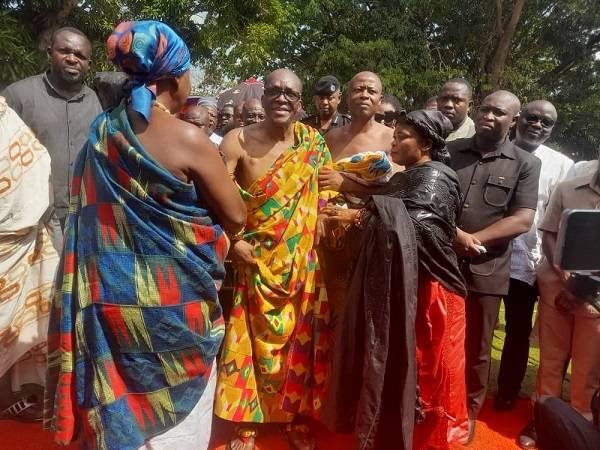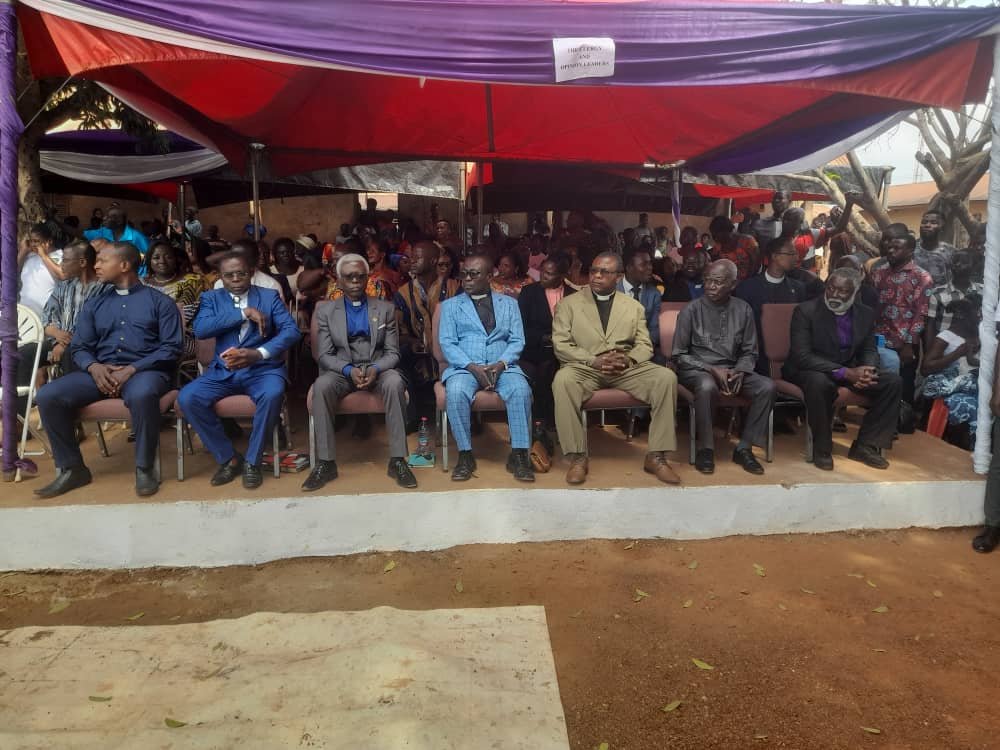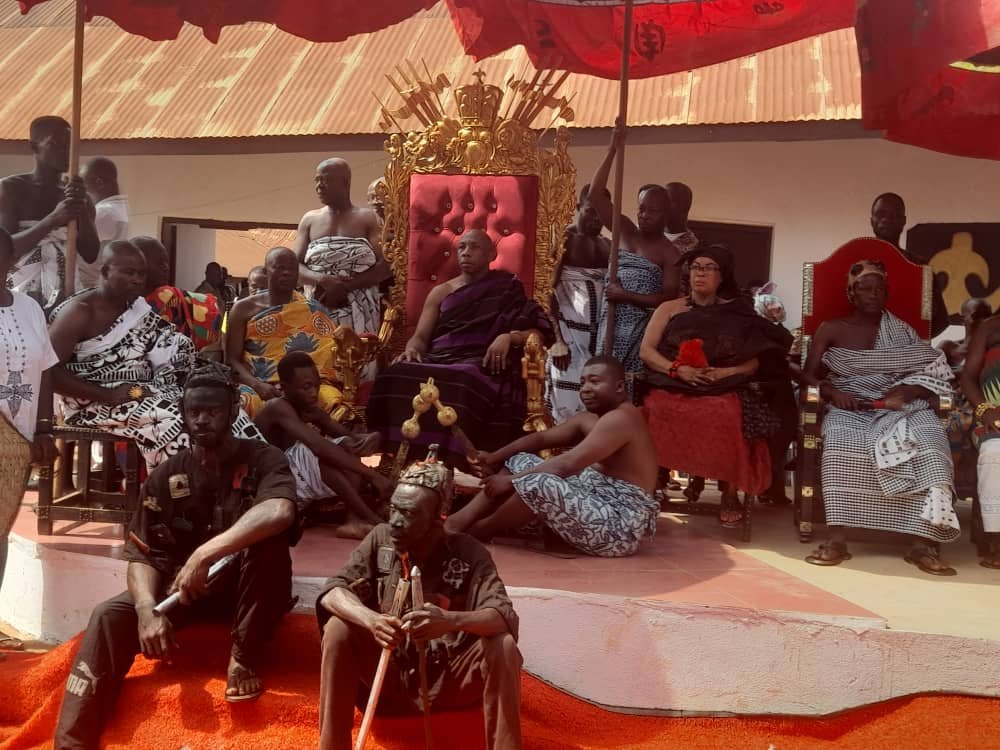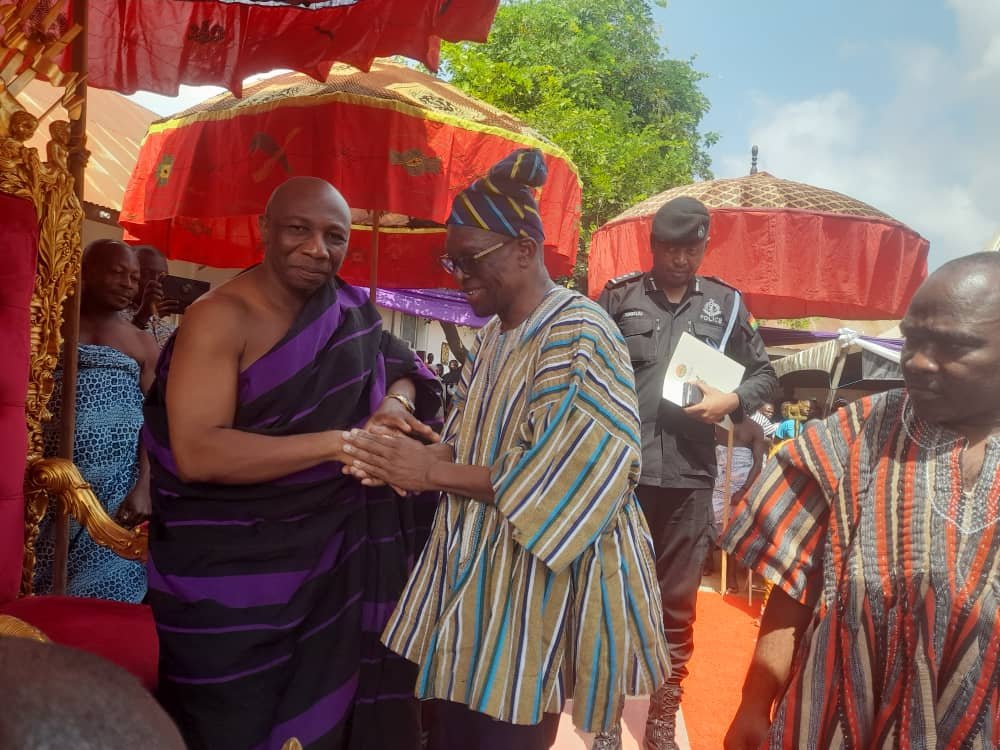Hot!
Alban Bagbin installed Chief in Suma

Speaker Bagbin(third left) on his way to the installation
The Suma Traditional Council (STC) at Suma in the Bono Region on Saturday installed the Speaker of Parliament, Mr Alban Sumana Kingsford Bagbin as a chief with the stool name Nana Adosorkorhene I.
The Speaker’s installation was to recognise his show of strength against western powers in the promotion of LGBTQ+ activities in the country.
It would be recalled that in July this year the Suma Traditional Council also awarded the Highest Order of the Suma State Adinkra award to Mr Bagbin for his advocacy on the anti- LGBTQ+ bill.
The colourful coronation was preceded by initiation rites performed behind closed doors before the coronation at the forecourt of the Suma Palace.
Mr Bagbin arrived at the Palace adorned in a beautiful smock and accompanied by his wife, Minority Caucus in Parliament, staff of the Parliamentary service board and other dignitaries.
Also in attendance were a delegation from the clergy made up of members of the Pentecostal Council, local council of churches led by the Bishop of Sunyani Diocese, Mathew Kwasi Gyamfi.
The occasion was to climax a week-long crusade organised by the STC for God’s blessings and protection on the Suma State under the theme “Who the Son therefore shall make you free, ye shall be free indeed.”
The Omanhene of the area, His Royal Majesty Odeneho Dr Affram Brempong III said Ghana’s culture was under threat and all effort must be made to preserve the culture, values and traditions of the Ghanaian society against any abominable indoctrination.
He said the Parliament of Ghana must pass the human and sexual rights and family values Bill 2021 into law to safeguard the moral fabric of the Ghanaian society.
The paramount chief explained that the Adosorkohene title given to Mr Bagbin means a tower of strength derived from the Suna deity which protected their ancestors against their enemies during wars and that people associate with Mr Bagbin of his resolve to ensure that Parliament pass the bill into law.
The Speaker of Parliament on his part expressed his excitement and delight for the honour bestowed on him by the chiefs and people of Suma.
His coronation, he said, was not for him alone but for the institutions of Parliament and Ghana as a whole.
He assured that Parliament will do the right thing to ensure that the LGBTQ+ bill was passed into law, adding that the cost of LGBTQ+ activities on the health system of the country cannot be borne by the state.
Mr Bagbin explained that countries promoting homosexuality were facing the brunt of it, stressing that Ghana will not be intimidated to tolerate such a bad culture.
He said his recent call for a change in the governance structure of the country to allow chiefs, religious bodies and the media was aimed at strengthening the democratic culture of the country.
He commended the chiefs and people of Suma for preserving their rich culture which he said had stood the test of time and called for peace and unity among traditional authorities in the country.
From Daniel Dzirasah, Suma Ahenkro
Hot!
Education Minister outlines plan for free schooling for learners with special needs

Education Minister Haruna Iddrissu has announced that government is working to make education free for all learners with special needs, with funding expected to come from GETFund.
He shared the plan during a press briefing with the media.
According to him, an initial estimate shows that the policy will require between 65 million and 100 million cedis every year.
He noted that GETFund currently has a budget of 9 million cedis, and with proper adjustments, it should be possible for the fund to release about 100 million cedis every other year to support the policy.
Mr Iddrissu added that government is also committed to providing free tertiary education for all persons with disabilities.
He explained that the support will go beyond classroom learning and will include feeding and the provision of assistive learning devices for learners with special needs.
By: Jacob Aggrey
Entertainment
Prophet Joseph Atarah releases new video

Ghana’s singing Prophet, Joseph Atarah, has released a video for his new song dubbed ‘Increase’. The video was directed and shot by renowned director, Sky Web.
The motivational video exhibits captivating dance moves, set against the vibrant and beautiful city of Accra. Prophet Atarah co-wrote the song with Nana Boateng.
Touching on the message during an interview on Hitz FM’s Daybreak Hitz, he said, ‘Increase’ is a motivational song telling people not to give up in their present situation. According to him, with determination and a relentless desire to succeed, God will make everything beautiful.
“As you trust in God’s plan, remember that ‘INCREASE’ is on the way. Just as seeds grow into harvest, your faith is growing into abundance. God’s got you, and His increase is surrounding you,” he added.
Prophet Atarah resigned from the military band in 2006 after an encounter with God to start his prophetic ministry and commenced his music journey about four years ago.
By Edem Mensah-Tsotorme
Join our WhatsApp Channel now!
https://whatsapp.com/channel/0029VbBElzjInlqHhl1aTU27






